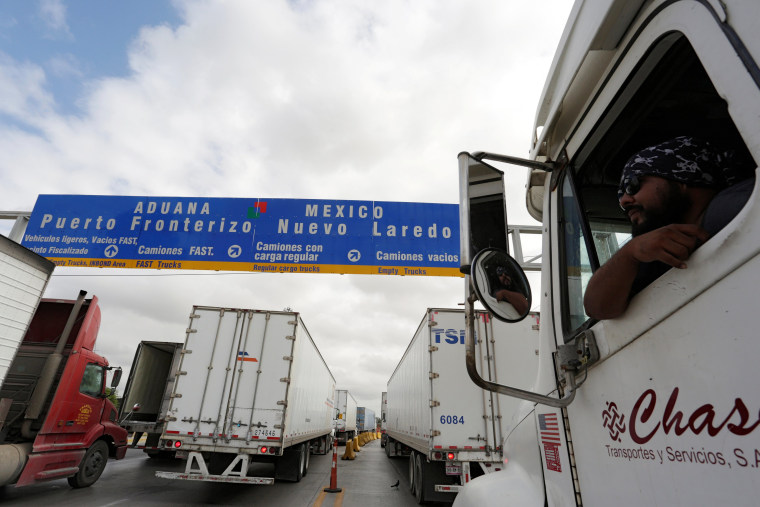The stakes are high this week for NAFTA negotiators, and for the future of the agreement itself.
At the World Economic Forum in Davos, Switzerland this week, President Donald Trump will have a global forum for his “America First” trade platform. His attendance will come on the heels of tariff actions on imported solar panels and washing machines, and on top of repeated threats to torpedo the landmark free trade agreement.
On Tuesday, Trump authorized tariffs of 30 percent on imported solar panels and 50 percent on imported washing machines, with the measures phasing out over four and three years, respectively.
“In terms of the tariffs, they’re certainly a sign that the Trump administration is starting to crack down on China, as it had announced,” said Monica de Bolle, senior fellow at the Peterson Institute for International Economics. “They don’t reflect necessarily what will happen with NAFTA. Of course, they coming at a time when Trump is about to go out to Davos,” she said, adding that the timing was likely intended to send a signal. “This whole Davos trip has an underlying theme.”
James Angel, associate professor of finance at Georgetown University’s McDonough School of Business, suggested that the tariffs on solar panels and washing machines — the former aimed at Chinese manufacturers, the latter primarily at Korean brands like LG and Samsung — are intended more as an expression of solidarity with the fossil fuel and manufacturing industries.
“He’s reassured his base that he’s tough on imports,” Angel said. “Maybe they’re thinking the tough action on China, maybe that’s enough.”
Protectionism and perception
But trade experts worry that this display of the same protectionist sentiments Trump expressed on the campaign trail and the early months of his presidency is an ominous sign for the $1.3 trillion in North American cross-border trade at stake when NAFTA negotiators meet in Montreal this week for the sixth round of talks on the 24-year-old agreement.
“It increases the credibility of any threats made at the negotiation table,” Angel said.
“The U.S. has asked for a lot,” said Simon Lester, trade policy analyst at the Cato Institute. “If they’re willing to concede on some of these things, then there’s hope for this,” he said.
That is a big “if,” though. Multiple trade experts give NAFTA’s survival a 50/50 chance. The biggest risk, some said, is the President growing frustrated with the pace of negotiations or a perceived lack of progress towards American interests.
“The danger is he’d treat it like a real estate deal, [where] in negotiations you always have the threat of just walking away,” Angel said. “There’s always another real estate deal somewhere else.”
But this tactic has its limits when it comes to negotiating with our closest and largest trade partners, and experts worry that Trump might not understand — or care — enough to make the distinction.
“The trick here is usually you have presidents whose views on trade are either formed from long experience or there’s an acknowledgement that this is a somewhat complex issue,” said Phil Levy, senior fellow on the global economy at the Chicago Council on Global Affairs, adding that neither of these is the case with Trump.
“The U.S. has asked for a lot. If it is willing to concede on some things, then there’s hope."
Brookings Institution senior fellow Joshua Meltzer said there were some indications that cooler heads were tempering of Trump’s more extreme boasts and threats, noting that the tenor of the comments had become less confrontational. “They want to keep this threat alive to be credible, but they’re more cautious about actually following through,” he said.
“At the same time, the counter-reigning narrative to that is he’s politically put himself into a very tight box,” Meltzer said of Trump, adding that he appeared to have few options for moving forward without appearing to walk back some of his more extreme positions. “I don’t know how he squares that circle, frankly,” he said.
Upending NAFTA for the sake of a misguided campaign promise would have real economic impact. A report last year from the U.S. Chamber of Commerce said trade with Canada and Mexico supports 14 million American jobs. Of those, 5 million — just over one-third — are a direct result of NAFTA’s trade increases. Since the implementation of the agreement, U.S. agricultural exports to Canada and Mexico have risen by 350 percent, and between 2009 and 2014 alone, American motor vehicle exports rose by almost 90 percent, the Chamber said.
Red states may suffer most
Scrapping NAFTA would hurt the automotive and agriculture sectors in particular, with trade experts predicting that the Middle America voters responsible for delivering the heartland to Donald Trump in the presidential election would bear the lion’s share of the economic pain.
“NAFTA is a very complicated deal and basically U.S. manufacturers have optimized around it,” Angel said. Automakers with facilities in North America might ship cars and car parts across national borders half a dozen times over the course of the assembly process.
“It’s a big story in a local sector-specific sense,” de Bolle said. “For farmers, it’s a very big deal. For certain automakers it’s very big deal. For rural Trump-voting states, it’s a very big deal.”
An even greater consequence would be a loss of credibility that could hobble American trade interests abroad for years to come, de Bolle said.
“It will send everybody this perception that the U.S. is not a trustworthy partner because it will always try to extract concessions without giving anything in return, and you can’t really get a deal done if you’re doing things that,” she said.
The advancements of other trade agreements such as the TPP indicate that political posturing could cost American interests abroad, Meltzer said. “This underscores the broader point that the rest of the world is moving forward with these broader trade agreements without the U.S.”
